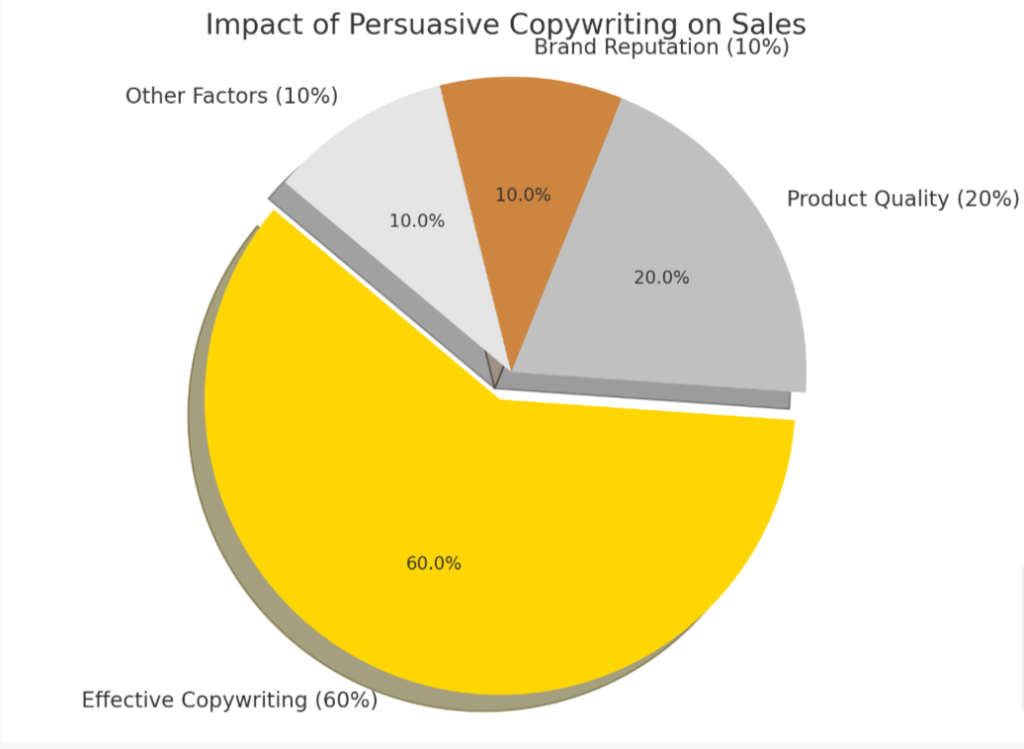Mastering Copywriting Techniques: The Path to High Earnings
Having trouble getting your voice heard in the crowded world of advertising? Fact is, persuasive words are powerful tools that can transform a business. This blog will unveil the masterful art of copywriting and how it can guide customers to action, bringing handsome returns for your bottom line.
Ready to revamp your marketing strategy? Let’s dive in!
Understanding the Power of Copywriting
Words have a powerful impact in marketing, as copywriting leverages the psychology of persuasion to drive sales.
The role of words in marketing
Words shape the foundation of every marketing strategy. From catchy slogans to compelling product descriptions, they have the power to attract, engage and convert potential customers into buyers.
Words are instrumental in presenting the value proposition of a product or service. They create resonating emotions among consumers which influence their purchase decisions. The right choice and arrangement of words can make advertising more effective by appealing to consumers’ wants and desires.
In essence, words give marketers an avenue to communicate with their audience creatively and persuasively.
The psychology of persuasion
Persuasion plays a critical role in human interactions and decision-making processes. The psychology of persuasion dives into how our brains respond to specific cues, triggers, or certain insights used intentionally to encourage someone towards making a particular choice or taking action.
It unfolds the science behind why consumers react positively to some advertisements but not others. Persuasive copywriting taps into these psychological principles to influence individuals’ purchasing behaviors subtly yet effectively.
By leveraging understanding of consumer psychology, effective copywriters craft content that resonates with the emotional desires, needs, and societal norms of their target audience stirring them to make buying decisions.
The impact of persuasive copywriting on sales
Persuasive copywriting acts as a catalyst for sales. It allures potential customers by creating powerful narratives around products or services, tapping into their emotions and needs.
By employing persuasive writing techniques, businesses can influence consumer behavior, urging them to make a purchase. High-quality copy not only draws in prospects but also motivates action—transforming curious visitors into loyal customers.
Therefore, persuasive copywriting directly impacts sales growth by driving conversions and enhancing customer retention.

Tailoring Copy to Your Ideal Customer
Identify your target audience and create a customer persona to understand their needs, desires, and preferences. Use language and messaging that resonates with them to effectively persuade and engage your ideal customers.
Identifying your target audience
Identifying your target audience is a crucial step in effective copywriting. By understanding who your ideal customers are, you can tailor your messaging to resonate with them and increase the chances of converting them into buyers. Consider the following factors when identifying your target audience:
- Demographics: Determine the age, gender, location, income level, and other relevant demographic information of your target audience.
- Psychographics: Look beyond demographics and consider the values, beliefs, attitudes, interests, and lifestyle choices of your audience.
- Needs and Pain Points: Understand what challenges or problems your audience faces that your product or service can solve.
- Behavior: Analyze the online behavior, purchasing patterns, and preferences of your target audience.
Creating a customer persona
Creating a customer persona is an important step in tailoring your copy to your ideal audience. Here are some key elements to consider:
- Demographics: Gather information about your target customers’ age, gender, location, and income level.
- Interests and Hobbies: Understand their preferences, hobbies, and interests to connect with them on a personal level.
- Challenges and Pain Points: Identify the problems they face and the pain points they experience in order to address their needs effectively.
- Goals and Aspirations: Determine what they aim to achieve or what they desire for themselves in order to align your messaging with their aspirations.
- Communication Style: Analyze how they prefer to communicate – whether it’s through formal or informal language, technical terms or everyday language, etc.
- Buying Behavior: Research how they make purchasing decisions – do they read reviews, compare prices, seek recommendations? Knowing this will help you craft persuasive copy that influences their buying behavior.
Using language and messaging that resonates with your audience
Crafting persuasive copy requires using language and messaging that deeply resonates with your audience. It’s important to understand who your target customers are, their needs, desires, and pain points in order to effectively communicate with them.
By speaking their language and addressing their specific concerns, you can create a connection that captures their attention and compels them to take action. Whether it’s using relatable anecdotes, highlighting the benefits of your product or service, or appealing to their emotions, tailoring your copy to resonate with your audience is crucial for successful persuasion.
The Copywriter’s Role in the Buying Process
Effective copywriting can influence buying decisions, compel action, and build trust for your business. Discover how a skilled copywriter can transform your marketing efforts and drive sales.
How effective copywriting can influence buying decisions
Effective copywriting has the power to significantly impact buying decisions. When crafted well, persuasive copy can tap into the desires and emotions of customers, compelling them to take action.
Using language and messaging that resonates with the target audience, a skilled copywriter can create a sense of urgency or highlight the benefits of a product or service in order to persuade potential buyers.
Additionally, crafting compelling calls to action and building trust and credibility through well-written copy are essential tactics for driving sales. By utilizing these techniques, businesses can greatly influence consumers’ purchasing choices and ultimately increase their revenue.
Crafting compelling calls to action
Crafting compelling calls to action is a crucial aspect of effective copywriting. A call to action (CTA) prompts the reader or viewer to take immediate action, such as making a purchase, signing up for a newsletter, or requesting more information.
By using persuasive language and creating a sense of urgency, a well-crafted CTA can significantly increase conversion rates. To make your CTAs more compelling, use strong verbs and actionable phrases that clearly communicate what you want the audience to do.
Incorporating scarcity or limited-time offers can also motivate potential customers to take action quickly. Additionally, consider placing CTAs strategically throughout your content and testing different variations to determine which ones generate the best results.
The success of your marketing efforts often hinges on how well you craft compelling calls to action. Whether it’s encouraging customers to buy now, sign up for a free trial, or donate to a cause, an effective CTA can be the difference between minimal response and incredible results.
Building trust and credibility through copy
Building trust and credibility through copy is essential for any business. By crafting persuasive and authentic content, you can establish a connection with your audience and demonstrate that you understand their needs.
Use testimonials and reviews to showcase your satisfied customers, as this will help build confidence in your brand. Additionally, make sure that your copy is transparent and honest, providing accurate information about your products or services.
This transparency will create trust and show potential customers that they can rely on you. Lastly, focus on delivering valuable content consistently to establish yourself as an expert in your industry.
Finding the Right Copywriter for Your Business
To find the right copywriter for your business, evaluate their skills and experience, understand pricing and payment options, ensure authenticity and transparency in their copy, and leverage recommendations and testimonials.
Evaluating skills and experience
Skills and experience are crucial when evaluating a copywriter for your business. Look for the following qualities to find the right fit:
- Strong writing skills: A copywriter should have excellent grammar, spelling, and punctuation.
- Creativity: Look for someone who can think outside the box and come up with unique and engaging ideas.
- Industry knowledge: Consider their understanding of your industry and target audience.
- Portfolio: Review their past work to see if their style aligns with your brand.
- Results-driven: Find out if they have a track record of delivering measurable results through their copy.
- Attention to detail: Copywriters need to be meticulous in their work to ensure accuracy and consistency.
- Adaptability: Look for someone who can easily adapt their writing style to different mediums and platforms.
- Collaboration skills: A good copywriter should be able to work well with others, including designers, marketers, and business owners.
- Professionalism: Evaluate how they communicate and present themselves as a professional in the industry.
- Reputation: Check for recommendations or testimonials from previous clients or colleagues.

Understanding pricing and payment options
Copywriters come with varying skills and experience, so it’s important to understand the pricing and payment options when hiring one. Here are some factors to consider:
- Skill level: Copywriters may charge different rates based on their expertise and track record. Evaluate their portfolio and previous work to determine if they align with your needs and budget.
- Hourly or project-based pricing: Some copywriters charge an hourly rate, while others prefer a fixed fee for each project. Consider which pricing structure works best for your business.
- Additional costs: It’s essential to clarify if extra costs, such as revisions or additional research, are included in the pricing or require separate payment.
- Payment terms: Discuss payment terms upfront to avoid any misunderstandings later on. Determine whether the copywriter requires a deposit, partial payments at milestones, or full payment upon completion.
- Licensing and usage rights: If you plan to use the copy across multiple platforms or in different regions, discuss licensing agreements with the copywriter to ensure proper compensation and usage rights.
- Contract agreement: To protect both parties involved, it’s crucial to have a written contract that outlines all terms and conditions of the project, including pricing and deliverables.
Ensuring authenticity and transparency in copy
Copywriting is a powerful tool for persuasion, but it’s crucial to ensure authenticity and transparency in the copy. By being honest and transparent, you can build trust with your audience.
Authenticity means delivering on your promises and offering genuine value. Transparency involves being clear about your intentions, pricing, and any potential limitations or risks associated with your product or service.
When your copy is authentic and transparent, it allows customers to make informed decisions based on accurate information. This not only builds credibility but also fosters long-term relationships with your audience.
Leveraging recommendations and testimonials.
Customers trust the opinions of others, making recommendations and testimonials powerful tools for influencing their buying decisions. By showcasing positive feedback from satisfied customers, businesses can leverage these endorsements to build credibility and trust in their products or services.
Recommendations and testimonials provide social proof, demonstrating that others have had a positive experience with the brand. This can alleviate potential doubts or hesitations that prospective buyers may have and increase their confidence in making a purchase.
Conclusion
Copywriting: The Art Of Persuasion Pays Well. Mastering the art of persuasive copy can lead to lucrative career opportunities in advertising, marketing, and sales. With the power to influence buying decisions, craft compelling calls to action, and build trust with customers, skilled copywriters are in high demand.
So if you’re looking for a creative and financially rewarding career path, consider diving into the world of copywriting. It’s a fun and fulfilling way to put your communication skills and persuasive techniques to work while earning top dollar.

